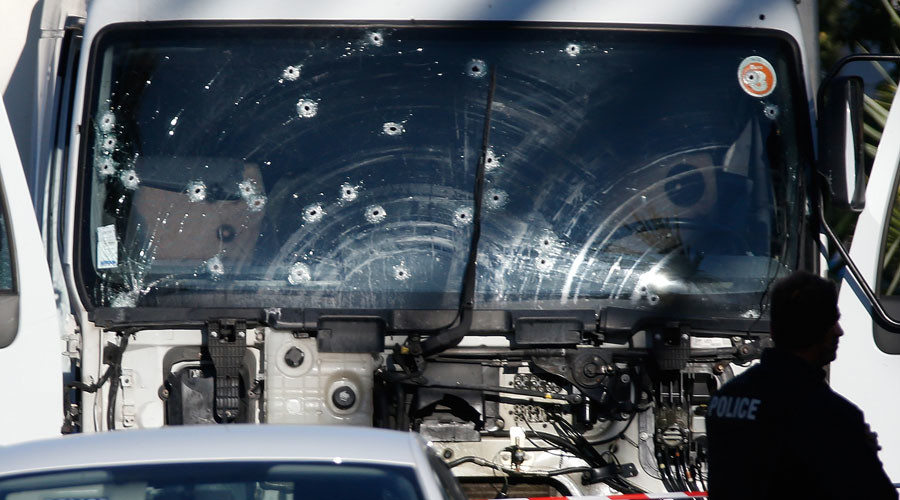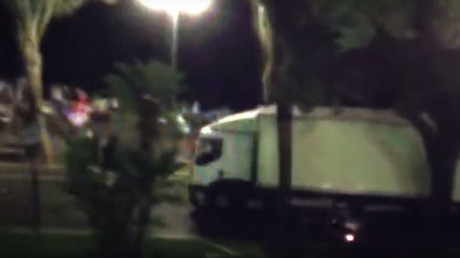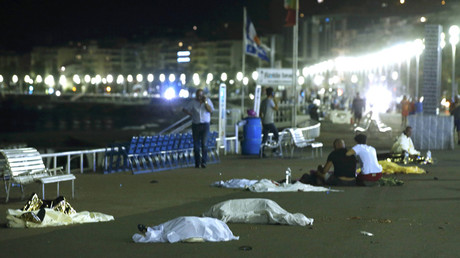
Bullet imacts are seen on the heavy truck the day after it ran into a crowd at high speed killing scores celebrating the Bastille Day July 14 national holiday on the Promenade des Anglais in Nice, France,
Carol Davis, a witness to the attack in Nice, told RT that French security services had not been paying enough attention to the area, where a few officers were “just kind of walking around, mostly talking to each other” prior to the attack.
“Although we are under state of emergency, there doesn’t seem to be any security,” Davis said, expressing her anger with the lack of police presence in the city during the mass celebrations on one of the main streets, which saw over 1,000 people coming to “experience fireworks, some joy” in a festive mood.
“Just the other day, I left the beach because I thought everybody could come here and shoot us,” she said, adding that the locals are “furious with the lack of security here.”
“We see very little security here; we see very little army; we see a few guys with machine guns; they were just kind of walking around, not really looking, mostly talking to each other,” she lamented, stressing that “nobody feels safe” in this kind of environment.

Commenting on the circumstances surrounding the attack, which saw a white truck loaded with weapons plow through a crowd after passing through a police barricade, she argued that the police could have done much more to stop the attacker.
“How did this truck come over the barricade. No car was supposed to get by that barricade. A police car could have just easily come around and stopped it, it should have stopped it,” the woman, who is a dual French and American citizen, said.
Although, she was not outside when the tragedy occurred, she saw the carnage unravel from the window of her house on Promenade des Angles. According to Davis, the street has become “an ongoing crime scene” with heavy police presence and a temporary hospital.
“Nobody knew what was going on at a time because there were fireworks happening for a good 15 minutes, loud, and then it ended, and then all of a sudden you heard that very strange noise,” Davis said, describing the chaos that ensued in the first minutes after the attack.
The behavior of police officers in the city prior to the attack also gave rise to serious concerns about their professional conduct and ability to stop an imminent terrorist attack.

“We see police around town on little bicycles and they are laughing, having fun and looking at their Facebook pages on their cell phones. They do not care about security here in Nice, at all, at all!” she noted.
Davis also weighed in on the possible political implications of the attack, saying that “unfortunately, what’s going to happen is that certain right-wing factions of the political world here are going to take advantage of something like this, especially now as they identify this guy as being of Tunisian decent from terrorism, from Nice.”
This is not the first time European law enforcement has come under fire. Samia Maktouf, a lawyer representing the parents of 26-year-old Valentin Ribet, who died in the Bataclan massacre in Paris, says the lax Belgian protection and surveillance system had allowed the terrorists to infiltrate French territory and carry out their attack.
The lawyer told RT that: “In the case of Bataclan suicide bomber Samy Amimour, it was well-known that he was a part of the group of terrorist recruiters and he was subject to a travel ban, but he managed to cross the border with a fake passport. The intelligence service simply didn’t do their work; they failed to stop him and did not inform other services inside and outside country.”
“Today we see a war between special services and it started a long time ago. They do not communicate with each other.”
“We expect that the relatives of other victims would join us; their mindset has changed; they no longer think that the death of their children, relatives were an inevitability.”
“They died because France failed to provide the security; they died because no one stopped known terrorists from committing an atrocity.”
Comments
Post a Comment